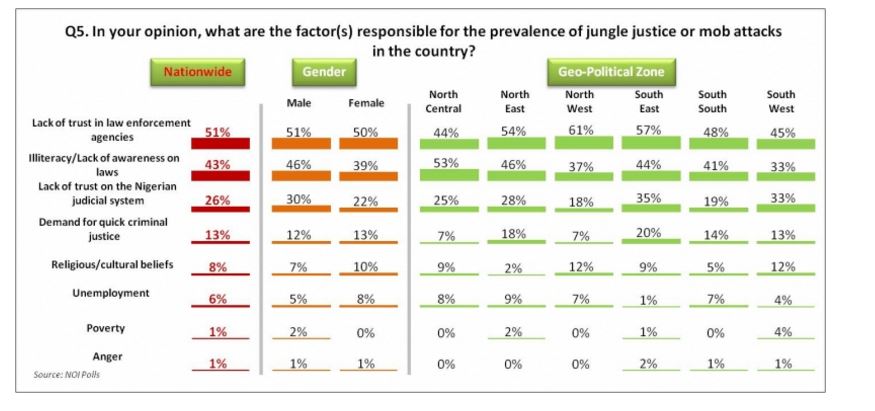In African China’s “Mr. President” the first verse features the Nigerian artist singing, “poor man wey thief maggi, omo dem go show him face for crime fighter, rich man wey thief money omo we no dey see their faces for crime fighter!” The song illuminates that in Nigeria, low class theft is more dangerous than high class theft. In situations involving the latter, the culprit is usually met with a pecuniary fine. In low class theft, however, the punishment is brutal.
In Ekiti state, David Olugboyega faces death by hanging because he stole N14, 570 from three people in 2003, Vanguard reports. Specifically, he robbed Kola Owolabi of N8,000; Beatrice Olawumi of N5,000 and Idowu Abiodun of N1,570. During the court proceeding David confessed to armed robbery, as he was in possession of a gun and a machete. Justice John Adeyeye sentenced David to death by hanging for the armed robbery committed on March 20, 2003. However, what does such an excessive fine suggest about the law in Nigeria?
In Nigeria, petty crimes often attract mobs who carry out jungle justice on the perpetrator(s). Jungle justice refers to when a criminal is punished through severe means by those present at the scene where the crime was committed, such as burning perpetrators with petrol. An example of this is the ALUU 4, where four male students were killed by a mob after being accused of robbery.
Survey company, NOI Polls, conducted a poll on jungle justice in 2013, which revealed that 94 percent of Nigerians agree that there is a high prevalence of jungle justice in Nigeria. However, 51 percent of the respondents, attributed the prevalence of jungle justice in the country to a “lack of trust in the law enforcement agencies”. According to the survey, 43 per cent of Nigerians have personally witnessed these acts of jungle justice while 16 percent have known the victims of jungle justice/mob attacks.

While jungle justice might seem appalling, the law in Nigeria supports the notion that some of these punishments are acceptable. For example, in Sokoto, Zamfara, Kano and other Northern states, the law allows the limbs of petty thieves to be cut off, regardless of how minor their crimes are, which underscores that jungle justice is only a by product of an inadequate legal system. In fact, it’s hard to differentiate between jungle justice and the law in the case of David Olugboyega.
What the law says:
Section 403 (1) and (2) of the Criminal Code stipulates that;
- (1) Any person who with intent to steal anything, assaults any other person and at or immediately after the time of assault, uses or threatens to use actual violence to any other person or any property in order to obtain the thing intended to be stolen shall upon conviction be sentenced to imprisonment for not less than fourteen years but not more than twenty years.
(2) If-
(a) any offender mentioned in subsection (1) of this section, is armed with any firearms or any offensive weapon or is in company with any other person so armed; or
(b) at or immediately before or immediately after the time of the assault the said offender wounds or uses any other personal violence to any person, the offender shall upon conviction be sentenced to imprisonment for life with or without whipping.
David Olugboyega’s sentence is also disturbing when we consider public officials who have misappropriated outrageous amounts of money but have merely endured a ‘slap on the wrist’ for their actions. For example, Nigerians were shocked when John Yesufu Yakubu’s was granted bail and a fine of a mere N750,000 over a N32.8 billion police pension fund that was allegedly misappropriated when he was Director of the Nigerian Police Pension Fund. Justice Abubakar Talba of the Abuja High Court released Yakubu after a plea bargain. In addition to the fine, he sacrificed N325 million worth of property to the Economic and Financial Crimes Commission (EFCC), which was purchased with the stolen funds.
The question is why do Nigerians have such a skewed vision of theft? If the justice system supports death sentencing as a viable punishment for petty theft while allowing public officials and those with means to bypass the law to no avail, jungle justice will continue to thrive. Further, those citizens who misstep and commit such crimes will continue to face unjust and excessive punishment. We need to problematise a legal system, which continues to support the inequality that is currently ravaging our country. Perhaps the first step to this is repealing these laws, which ironically pave the way for a lawless society.








